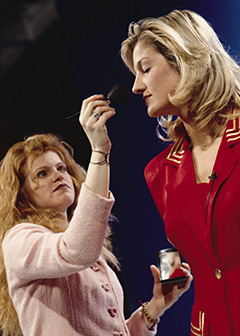
An actress prepares for an audition.
Many actors enhance their skills through formal dramatic training. Especially in theater, many actors have a bachelor’s degree, although it is not required. Actors usually learn some of their skills on the job; therefore, long-term training is common.
Education
Although some people succeed in acting without getting a formal education, most actors acquire some formal training through an acting conservatory or a university drama or theater arts program. Students can take college classes in drama or filmmaking to prepare for a career as an actor. Classes in dance or music may help as well. Actors who do not get a college degree may take acting or film classes to learn their craft. Community colleges, acting conservatories, and private film schools offer these classes. Many community theaters also have education programs. A bachelor’s of arts degree in theater is becoming more common among stage actors.
Training
It takes many years of practice to develop the skills needed to be successful, and actors never truly finish training. They work to improve their acting skills throughout their career. Many actors continue to train through workshops or mentoring by a drama coach.
Every role is different, and an actor may need to learn something new each time. For example, a role may require learning how to sing or dance, or an actor may have to learn a foreign accent or how to play an instrument or a sport.
Many aspiring actors participate in high school, college, and local community plays. In television and film, actors usually start out in smaller roles or independent movies and work their way up to bigger productions.
Advancement
As an actor’s reputation grows, he or she may work on bigger projects or in more prestigious venues. Some actors become producers or directors. For more information, see the profile on producers and directors.
Important Qualities
Creativity. Actors interpret their characters’ feelings and motives to portray the characters in the most believable way.
Memorization skills. Actors memorize many lines before filming begins or a show opens. Television actors often appear on camera and have little time to memorize scripts, which can be revised frequently or written moments before filming.
Persistence. Actors may audition for many roles before getting a job. They must be able to take rejection and keep going.
Physical stamina. Actors should be in good enough physical condition to endure heat from stage or studio lights and the weight of heavy costumes. They may work long hours, including more than one performance a day, and they must do so without getting overly tired.
Reading skills. When looking for a new role, actors read many scripts and must be able to interpret how a writer has described their character.
Speaking skills. Actors, particularly stage actors, must be able to say their lines clearly, project their voice, and pronounce words so that the audience understands them.
In addition to these qualities, actors usually must be physically coordinated to perform predetermined, sometimes complex movements with other actors to complete a scene.














